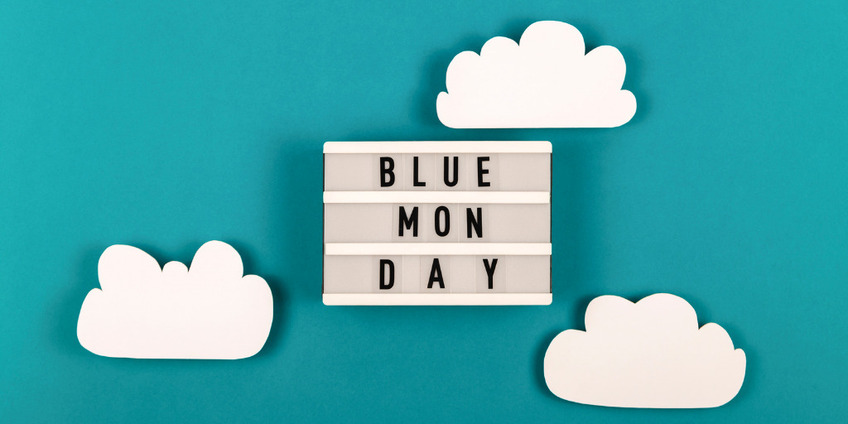BUSINESS SUPPORT & TRAINING
(Not so) Blue Monday

(Not so) Blue Monday
The third Monday in January, otherwise known as ‘Blue Monday’, is supposed to be the most depressing day of the year. Spoiler alert: it isn’t. However, that doesn’t mean it’s not a good excuse to make sure we are focusing on our mental and physical wellbeing - both in and out of work hours.
There are unique challenges that come with owning a small business and for those who are self-employed. Considering that small and medium organisations account for 99% of the businesses in the UK, it’s important to make sure you are taking care of yourself.
Everybody’s different, but here are some ideas to support you:
Talk about it
There is still a stigma attached to mental wellbeing. One way to overcome this is to openly talk about it. Discuss it with your friends, your family, your co-workers, your GP, your network. Voicing your own, or someone else's, concerns or worries can greatly help to protect your wellbeing.
We understand it can be difficult opening up, or it might make you feel uncomfortable, but here at SiGNAL, we pride ourselves on being an inclusive community of like-minded people. We greatly encourage openness and solidarity amongst our co-workers. If you’ve got something impacting your work, maybe suggest grabbing a coffee and going for a walk, or going out to enjoy some well-deserved lunch. This will give you an opportunity to convey your worry with someone you can trust, and (as the old adage goes), a problem shared is a problem halved.
If you feel you need it, there is also plenty of professional help available to you. Take a look at Mind’s “Mental Health at work”, which has some great resources.
Set boundaries
As tricky as it may feel, it is really important to set boundaries for yourself and take some time away from work and your screen throughout the day.
Don’t wait until you feel fatigued to take a short break from your computer. Try and keep an eye on the time, or set yourself reminders, and make an effort to take a breather every hour. This could be as simple as a leg stretch around the office, spending a few minutes looking out of the window, or making yourself (or another) a refreshment. Not only do these small breaks help with eye strain and muscle aches, they can actually increase the flow of ideas, leaving you fresh to continue when you return to your workspace.
Just as important as small breaks, is getting a longer period of time away from work. Taking a few days or a week’s leave in order to switch off from work-mode will leave you feeling rested, relaxed and resilient. Time off helps with productivity; increasing your motivation and energy for the work when you return. So set that out of office and focus on you.
Catch those Zzzs
Stress and sleep can create a vicious cycle. When we’re stressed, we don’t sleep as well, and when we’re tired, we are more prone to stress. Most people need around 8 hours of good quality sleep per night " with some needing more and some less. What matters most is that you find out what your optimal time for sleeping is and stick to it. This means you won’t spend your day longing for a nap.
Not only is it stressful not getting enough sleep, but poor sleep quality could have an effect on your work too. A poor night’s sleep may lead to a lack of focus the next day: if you are regularly not getting enough quality hours in then it could give you ‘brain fog’, making it difficult to concentrate or make decisions. If you’re struggling with your sleep, you won’t be surprised to hear that there is an app for that. The best 14 sleep apps have been described and rounded up into one useful blog here: https://www.yours.co.uk/wellbeing/health/the-best-sleep-apps/.
Spend time outside
Being outdoors, enjoying nature, can have a dramatic influence on our mental and physical wellbeing. Regular time spent outside helps to boost your mood and energy which will in turn improve your focus. Nature is a powerful remedy for distracted thinking. The internet, smart phones, and social media place a huge and constant demand on your attention. When you spend time outdoors, this provides you with time for effortless reflection.
As well as being outdoors in general, exercising is equally important. If you’re fortunate enough to be within walking or cycling distance of where you work or where your next meeting is, then I implore you to take that opportunity. Not only is travelling by bicycle or on your own two feet better for the environment, it will also mean you’re less stressed and in a far greater mood when you arrive at your destination.
If you can’t get outdoors, then time spent inside at a gym, swimming pool, or at a fitness class will also positively contribute to both your physical and mental wellbeing. You’ll thank me later when you get that rush of dopamine after a great workout!
We know that sometimes (even pre-pandemic) if you work for yourself, it’s tricky to take a break from your job, and often it can be hard to focus on wellbeing. We encourage you to not only think about this on ‘Blue Monday’, but to incorporate it into your everyday work life.
Believe us when we say, your business’ best resource is you " so look after it!







